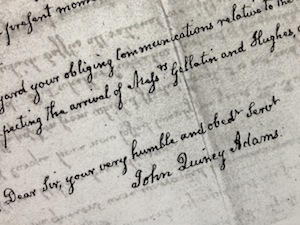1814. The United States is more than two years into a war we can’t afford. And can’t afford to lose. Albert Gallatin has left his post as Secretary of the Treasury to help John Quincy Adams and Henry Clay and a few other diplomats negotiate a peace treaty with the British. Everyone knows that peace is inevitable and will happen soon. Still, each side stalls, reengages and stalls – depending on who won the latest skirmish across the Atlantic and how the European powers seem to be realigning, now that they’ve driven Napoleon into exile. At least for now.
While waiting in Ghent, Gallatin, Adams and Clay write letters to U.S. diplomats throughout Europe and to their colleagues back in Washington City. In an exercise I think of as “show me your thinking,” they assess the situations in play and speculate on the impact.
Like all good leaders, Gallatin, Adams and Clay are good politicians. Each is skilled at understanding motives and calculating risk. They weigh the pros and cons of borrowing more money from European banks. They contemplate the outcome if, as expected, Congress decides to reestablish a federal bank. They consider the ways in which the Europeans might redraw the map of Europe. They speculate on the future of France, wondering if anyone will step in to lead and wondering how the situation will change with France and Britain no longer at war.
The men in Ghent also write about the risk of losing the support of the People. Americans are divided about the growing debt – what it means to the country and what we should do about it. They aren’t sure we can beat the British. And as the negotiators know, perception is reality. Adams complains that Britain “owns the presses throughout Europe,” which, of course, impacts what America can demand at the negotiating table and what Americans will support.
I know these things because I am reading the letters of Gallatin, Adams and Clay – real letters written in their own hands. I am currently helping out in the family business, Cowan’s Auctions. While my actual job is to launch a few strategic initiatives, I also get to do a bit of the fun work that Cowan’s does every day.
These letters tell me a lot about the business of communication. The sons of the Founding Fathers took great care to express their thoughts, if not always succinctly (apologies to always-succinct Adams). They were serious about being understood and serious about understanding what others had to say.
Why such care? I think it’s because they understood the connection between communication and leadership: To lead, you have to bring people along. You have to show your thinking – how it flows from what you see around you. Today, much of the effort we put into communication is about the WHAT and HOW. These 200 year-old letters remind me that, without the WHY the rest doesn’t matter.
